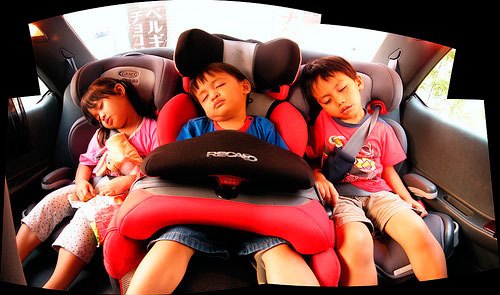Vacations are wonderful. The toughest part, however, may be the ride home. You have had a great time and so have your kids but going home takes forever. That is true no matter how far it is.
So what can you do to help make the ride easier, more fun and even seem shorter? The key is having a good time.
What can you do to make it a good time? You need to plan ahead for activities for your children no matter what their ages. Bring along some goodies such as a piece of candy or gum, a drink, a small bag of popcorn and anything else you can think of to use for prizes. You can use these as incentives when you play some games.
Some general things to bring include items like coloring books, reading books and music or even if you have the right equipment, movies the kids can watch. But don’t just do these kinds of things; do some things that are different.
For young children you need to find something easy to do. If you are where there are animals, have them see how many they can count as they drive past. Cows or horses are great. If there are a lot of them, then have them count the white ones or the single colored ones. If you are in an urban area, have them count red cars.
Other ideas:
• Stop at scenic spots and learn what is important about them. No matter what your children’s ages, they may learn something new.
• Sing songs together. They don’t have to be the ones that only the children know. Let the parents sing some they know, too.
• Check out the license plates and see what words your older child can make out of them. You need to do this with them to make it competitive. You also can go through the alphabet and have your child find an item outside that begins with each letter.
• Look ahead at something far in the distance but on the road you are driving. Everyone can guess how many miles to get there. See who is the best judge of distance.
• Tell them before the trip that there is going to be a joke contest. Tell them to be prepared. On the trip have each person tell one joke and then vote on who has the funniest joke.
• Ask some questions about places you were on the trip. Even if you spent the time with relatives, ask who they are, who they are related to and what the names are of each of their children (even if they weren’t there).
• Talk about the trip. A parent can start it out about something he or she has learned or found out on the trip. Then ask the kids to join in. Ask them where they would like to go and what they would like to see on the next trip. It doesn’t have to be realistic; just let them dream.
• Visit any museum you find. Stop at each exhibit and see if there is a question your child might answer about something he sees. When you are back in the car, offer him a reward if he can answer your question. If he gets the right answer, he certainly will pay attention at the next museum or stop. If he doesn’t get the right answer, he may pay more attention at the next museum or stop.
• In the last hour of the trip, ask him to write three paragraphs about the most important things he enjoyed on the trip. You will learn something about what he values and he will exercise his writing skills.
Children remember trips you take as a family long after they remember where they went. You are a key as to why that happens. Put some effort into making your drive home a special time together. Plan ahead and have special things to do.
Bring along things for them to do that they might never do when they are home.
Spend the time together in ways they will remember for the rest of their lives. It is worth a little extra effort to make this happen. It makes the trip better for you as well as for them.
Cynthia Martin is the founder of the First Teacher program and director of Parenting Matters Foundation, which publishes newsletters for parents, caregivers and grandparents. Reach Martin at pmf@olypen.com or at 681-2250.



